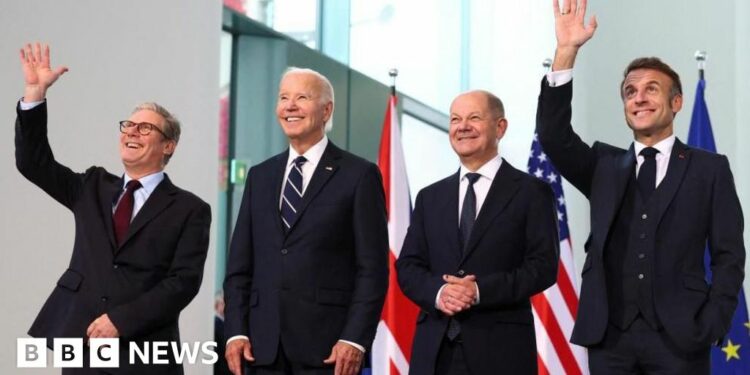The conflict in Ukraine, since Russia’s full-scale invasion, is the worst war this continent has experienced since World War Two.
And as it did 80 years ago, Europe has looked to the US for co-ordinated leadership and military support.
But Biden insisted far more needed to be done: “We must keep going until Ukraine wins a just and durable peace… We must sustain our support.”
A lot will depend on who wins the November US election.
Europe has relied on US military aid to help Ukraine. Berlin is the second largest donor after Washington, though the volume pales in significance compared with its ally’s across the Atlantic.
Those days of American largesse are expected to be over as soon as Biden leaves the White House.
Even if Democratic candidate Kamala Harris becomes the next US president, Congress is thought likely to pivot to other foreign policy priorities, such as China and Taiwan.
As for Trump, during his 2016-2020 administration, relations with Nato – the transatlantic military alliance in place since WW2 – were famously turbulent.
He is known for having admired “strongman” Russian President Vladimir Putin and he has not yet said in public if he wants Kyiv to emerge victorious from the conflict.
Despite lots of corridor talk in Nato circles about “Trump-proofing” European defence before the forthcoming US election, there is little sign that has actually taken place or that Europe would be able to successfully “go it alone” if it had to.
Following Russia’s full-scale invasion in 2022, the German Chancellor, Olaf Scholz, promised a “Zeitenwende”, a historical turning point, where his country would jump over the shadow of its Nazi past and invest massively in its military to fully contribute to its allies’ shared defence.
This week, German intelligence chiefs warned Russia’s continued investment in its military would see it in a position to attack Nato by the end of the decade.
But Germany’s planned military revamp has got bogged down in bureaucracy. The government has not even agreed a future defence budget.
Diplomats say Biden worries about European resolve, with signs of spreading “Ukraine fatigue” as allies in Europe grapple with their own domestic challenges.
Scholz is under considerable pressure at home from the popular far right and far left, both sympathetic to the Russian narrative, ahead of a general election next year.
On Friday, Scholz and Biden were joined in Berlin by fellow major Ukraine donors the UK and France.
The “Quad”, as these four big Nato powers are known, also discussed Iran and the wider Middle East. On Ukraine, their joint press statement reiterated a resolve to continue supporting Kyiv.
The British Prime Minister, Sir Keir Starmer, said Russia was getting weaker and that the war was soaking up 40% of Moscow’s budget.
He said he and the other leaders had discussed “what further capability, what further equipment and what further resources” they could help Ukraine with. But he did not get into specifics.
Yet it is specifics the Ukrainian President, Volodymyr Zelensky, has asked for in his “victory plan”. Specifics like an official invitation to join Nato and a free hand in using the long-range missiles supplied by the UK and France. A request that to date has been denied.
Kyiv sees an engaged Biden on his way out of office, Scholz predicted to lose next year’s German general election and French President Emmanuel Macron politically hobbled at home.
For Ukraine, extra help from its biggest backers cannot come fast enough. On the backfoot against Russia along its frontlines, the country is in a particularly vulnerable moment. The rest of Europe is too.
Source link : https://www.bbc.co.uk/news/articles/cz9p8455l4xo
Author :
Publish date : 2024-10-19 04:25:00
Copyright for syndicated content belongs to the linked Source.


